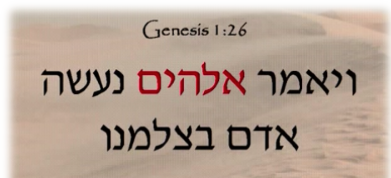This week we read about God’s creation of the universe ex nihilo- out of complete nothingness. He created in stages, over the course of six days, and waited to the final day to create Adam, and then Chavah (Eve) as his mate. Our rabbis explain that man was made after the other creations because he is the very purpose of creation; this way, Adam and Chavah entered a world that had been specifically prepared for their influence and enjoyment.
Hashem expressed his intention to create Man as He had enunciated all other creations. Here, though, Hashem deviated from the expressions He had used previously:
And God said, “Let us make man in our image, after our likeness, and they shall rule over the fish of the sea and over the fowl of the heaven and over the animals and over all the earth and over all the creeping things that creep upon the earth.”
-Bereishit 1:26
This phrase sounds as if Hashem is talking with others and collaborating with them in creating Man, and yet that doesn’t make any sense- He surely created the entire universe alone, with no need or reason to use ‘help’ in the process. So what’s going on here? Rashi solves the riddle:
From here we learn the humility of the Holy One, blessed be He. Since man was created in the likeness of the angels, and they would envy him, He consulted them…
-Rashi
And later on:
Even though they [the angels] did not assist Him in His creation, and there is an opportunity for the heretics to rebel (to misconstrue the plural as a basis for their heresies), Scripture did not hesitate to teach proper conduct and the trait of humility, that the greater one should consult with and receive formal permission from a smaller one.
Had it been written: “I shall make man,” we would not have learned that He was speaking with His tribunal, but to Himself.
[And the refutation to the heretics is written alongside it (i. e., in the following verse:) “And God created, and it does not say, “and they created.”]
-Rashi, ibid; Midrash
We learn two important lessons here. Firstly, we see the importance of humility, and this is obviously a message meant for us to internalize. If Hashem Himself includes the angels in His most important creation, how much more must we, His creations, take care to be humble and considerate of other peoples’ feelings. Even as we accomplish and grow, we must remember the infinite gap between ourselves and Hashem, and recognize that even our successes are expressions of God’s incredible kindness to us.
The Orchot Tzaddikim echoes this lesson in its chapter on humility, although without citing our verse:
The primary humility is (expressed by) how one subjugates himself to his subordinates, such as his servants and members of household, and to those poor people who are supported and derive benefit from him – while he does not need them and does not fear them…
-Orchot Tzadikim, ‘The Gate of Humility’
The Mesilat Yesharim writes a similar thought:
Above all one should always contemplate to recognize the weakness of human intelligence and its many errors and inconsistencies- for it is always closer to errors than it is to true knowledge. Therefore he should always fear this danger, and seek to learn always from every person, and to always listen to advice, lest he stumble. And that is what (the Rabbis) of blessed memory said:
Who is a wise man? One who learns from all people. (-Pirkei Avot, 4:1)
-Mesilat Yesharim, ‘On the Ways of Acquiring Humility’ (Chapter 23).
Rav Shlomo Brevda observed that the Torah could have used any other part of Creation to teach us to be humble, yet Hashem chose to do so here, when creating Adam. This hints that Hashem imprinted human beings with the need to consult with others in order to succeed- and when people ask for advice, they grow in the trait of humility since they attribute success to others’ help!
-Kishutei Torah, citing Rav Brevda
The Talmud itself teaches:
Whoever becomes haughty, it is as if he serves idols.
-Gemara Sotah 4
The Perashat Derachim uses Rashi’s explanation to give a stunning explanation of the above statement…
-Based on the lesson we learn in humility- and Hashem’s willingness to teach it even though the plural language of “let us make” gives non-believers an opening to deny the truth of Hashem’s absolute control- we see the meaning of this comparison. A humble person accepts the lesson that Hashem has given us to be modest and to consult with others- yet the haughty person denies these principles and thus must be disregarding an interpretation teaching that Hashem Himself did exactly that. Therefore, by dismissing this lesson, the haughty person is essentially promoting a blasphemous reading of the text, as if it says that Hashem created Adam together with the angels. Certainly, then, one who is haughty is guilty of idol worship!
May we all grow in humbleness and thereby grow closer to our Creator.
Have a great Shabbat!
Elli Schwarcz
Elli Schwarcz is an alumnus of the Toras Moshe, Ner Israel, and Carteret Yeshivos, and has been involved in Jewish outreach for almost 15 years. He is a Hebrew School and English Language Arts teacher, and has a Master’s Degree in Counseling from Johns Hopkins University. Of all his pursuits, Elli most enjoys teaching high-level Jewish thought and Talmud to teenage boys, exposing them to the beauty and wisdom of their heritage while highlighting their own ability to engage in advanced Torah learning. Elli lives in Lakewood, New Jersey, with his wife and children.
